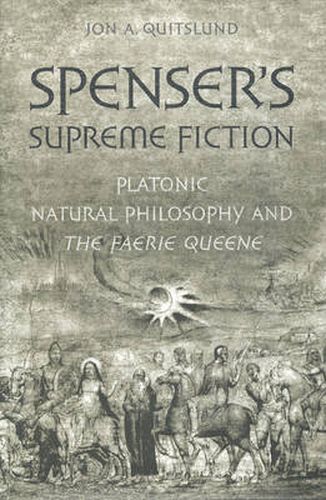Readings Newsletter
Become a Readings Member to make your shopping experience even easier.
Sign in or sign up for free!
You’re not far away from qualifying for FREE standard shipping within Australia
You’ve qualified for FREE standard shipping within Australia
The cart is loading…






Jon A. Quitslund offers an analysis of The Faerie Queene and of several texts contributing to the revival of Platonism stimulated by Marsilio Ficino’s labours as a translator and interpreter of Plato and the ancient Neoplatonists. To the old issue of the scope and character of Spenser’s Platonsim, Professor Quitslund brings insights from contemporary views on gender and identity, intertextuality, and the centrality of fiction within all aspects of Renaissance culture. He argues that Spenser sought authority for his poem by grounding its narrative in a divinely ordained natural order, intelligible in terms derived from the ancient sources of poetry and philosophy. The first half of the book examines Spenser’s representation of the macrocosm and its replication in human nature’s lesser world in the light of divergent tendencies within humanism. The legacy of Plato is shown to be especially important in the esoteric tradition, which made the province of natural philosophy part of the soul’s itinerary back to its otherworldly origins. In the second half, The Faerie Queene is interpreted as an unfolding pattern: the dynamic order of nature is flawed but not fallen, and seen against that background, human culture contains in its myths and images both corruptions of natural impulses and aspirations to transcend the limits imposed by mortality.
$9.00 standard shipping within Australia
FREE standard shipping within Australia for orders over $100.00
Express & International shipping calculated at checkout
Jon A. Quitslund offers an analysis of The Faerie Queene and of several texts contributing to the revival of Platonism stimulated by Marsilio Ficino’s labours as a translator and interpreter of Plato and the ancient Neoplatonists. To the old issue of the scope and character of Spenser’s Platonsim, Professor Quitslund brings insights from contemporary views on gender and identity, intertextuality, and the centrality of fiction within all aspects of Renaissance culture. He argues that Spenser sought authority for his poem by grounding its narrative in a divinely ordained natural order, intelligible in terms derived from the ancient sources of poetry and philosophy. The first half of the book examines Spenser’s representation of the macrocosm and its replication in human nature’s lesser world in the light of divergent tendencies within humanism. The legacy of Plato is shown to be especially important in the esoteric tradition, which made the province of natural philosophy part of the soul’s itinerary back to its otherworldly origins. In the second half, The Faerie Queene is interpreted as an unfolding pattern: the dynamic order of nature is flawed but not fallen, and seen against that background, human culture contains in its myths and images both corruptions of natural impulses and aspirations to transcend the limits imposed by mortality.